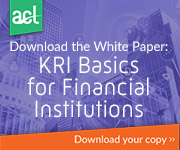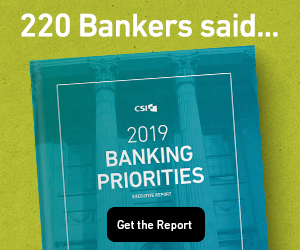|
This ABA Banking Journal newsletter is a free, twice-monthly supplement to the ABA Banking Journal magazine intended to help you stay on top of industry and policy news.
You can also stay abreast of banking news by visiting aba.com/BankingJournal, home to ABA Daily Newsbytes stories, digital exclusives, the ABA Banking Journal Podcast and more.
Banks frequently absorb fraud losses when the consumer is compensated for damage done by other sectors. But as data breaches have continued to become more pervasive, some financial institutions are now suing merchants to recover additional data breach costs which may fall outside of those covered in contracts with payment brands. (ABA Banking Journal)
|
U.S. small business optimism surged to a record in August as the tax cuts and deregulation efforts of President Donald Trump and the Republican-led Congress led to more sales, hiring and investment, according to a survey by the National Federation of Independent Business. (CNBC)
|
Debit card use and market penetration continued to grow in 2017, while fraud losses declined, according to Pulse’s debit issuer survey released today. The rate of checking accounts with associated debit cards ticked up one point to 76 percent, while the share of debit cards used at least once per month rose one point to 66 percent. (ABA Banking Journal)
|
Cryptocurrency startup funding exploded onto the scene in 2017. It’s been the wild west, rife with scams—until now. Thomas Carter is legitimizing this new way of funding, changing the game for startup funding and building faith in cryptocurrency. (Entrepreneur)
|
As the nation commemorated the anniversary of the Sept. 11 attacks this week, hear how Mars Bank uses the occasion to honor military personnel, veterans and first responders through its Step Forward campaign, which runs between Sept. 11 and Veterans Day on Nov. 11. (ABA Banking Journal)
|
American incomes rose and poverty declined for the third consecutive year in 2017, according to census figures released this week that suggest more Americans are benefiting from the robust economy. (Wall Street Journal)
|
The House Financial Services Committee has approved several financial services bills this week, including two ABA-supported bills. The committee passed H.R. 6158, a bipartisan bill that would exempt affiliates and subsidiaries of insured depositories from the definition of "deposit broker" under Section 29 of the Federal Deposit Insurance Act; and H.R. 6743, amending the Gramm-Leach-Bliley Act to codify existing data breach notification standards for the financial services industry. (ABA Banking Journal)
|
The House Ways and Means Committee recently approved three bills referred to collectively as "tax reform 2.0." These bills are a follow-up to the tax reform law that Congress passed and President Trump signed into law in late 2017. (ABA Banking Journal)
|
The Financial Crimes Enforcement Network announced that it would grant permanent relief from beneficial ownership requirements for certificate of deposit rollovers and loans that renew automatically; loans where the renewal, modification or extension does not require underwriting; and safe deposit box renewals. The exception applies to rollovers, renewals, modification or extensions occurring on or after May 11, 2018. (ABA Banking Journal)
|
The FDIC has issued a request for comment on a proposed rule to implement Section 202 of S. 2155, the new regulatory reform law. Under the proposed rule, well-capitalized and well-rated institutions would not be required to treat reciprocal deposits as brokered deposits up to the lesser of 20 percent of its total liabilities or $5 billion. (ABA Banking Journal)
|
The OCC issued a proposed rule that would implement an-ABA advocated provision in the regulatory reform law that permits certain federal thrifts to elect the rights and duties of national banks without having to change charters. (ABA Banking Journal)
|
As lawmakers contemplate further changes to the U.S. tax code, Florida Bankers Association President and CEO Alex Sanchez in a CNBC op-ed made the case for closing the outdated loophole that allows large credit unions to avoid paying federal taxes, even though they effectively operate in the same manner as taxpaying banks. (CNBC)
|
|








